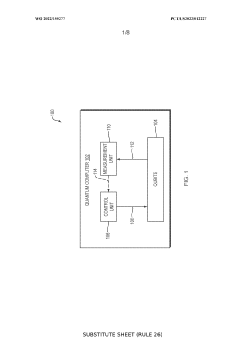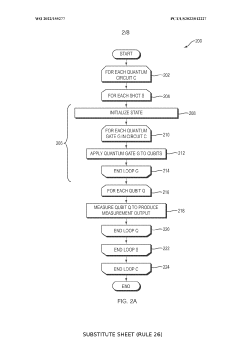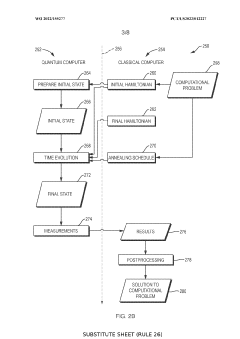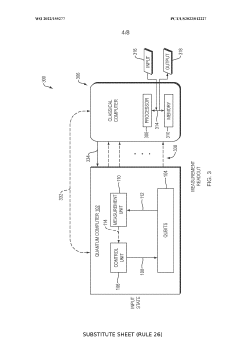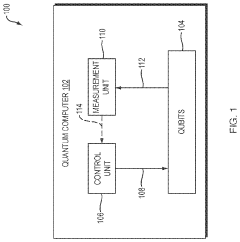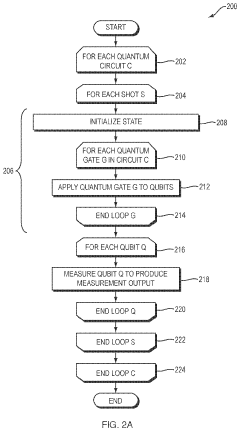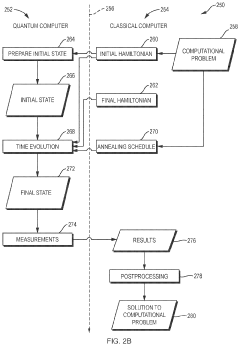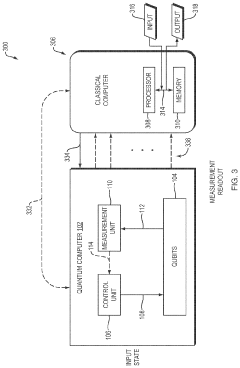Quantum Computing in Enhancing Natural Language Processing
JUL 17, 20258 MIN READ
Generate Your Research Report Instantly with AI Agent
Patsnap Eureka helps you evaluate technical feasibility & market potential.
Quantum NLP Evolution
The evolution of Quantum Natural Language Processing (Quantum NLP) represents a significant paradigm shift in the field of computational linguistics and artificial intelligence. This emerging discipline combines the principles of quantum computing with traditional NLP techniques, promising to revolutionize how we process and understand human language.
The journey of Quantum NLP began with the recognition of quantum computing's potential to address the limitations of classical NLP systems. Early theoretical work in the late 2000s explored the possibility of leveraging quantum superposition and entanglement to enhance language processing tasks. These initial studies laid the groundwork for more concrete applications in the following decade.
By the mid-2010s, researchers started developing quantum algorithms specifically tailored for NLP tasks. One of the key milestones was the introduction of quantum-inspired word embeddings, which aimed to capture semantic relationships more accurately than classical methods. This development opened up new avenues for improving various NLP applications, including machine translation, sentiment analysis, and text classification.
The late 2010s saw the emergence of quantum circuit-based models for natural language processing. These models utilized the principles of quantum gates and measurements to process textual data, offering potential advantages in terms of computational efficiency and expressive power. Concurrently, hybrid quantum-classical approaches began to gain traction, combining the strengths of both paradigms to tackle complex NLP challenges.
In recent years, the field has witnessed significant advancements in quantum-enhanced machine learning algorithms for NLP. Researchers have developed quantum versions of popular classical algorithms, such as quantum support vector machines and quantum neural networks, demonstrating improved performance on various language tasks. These developments have paved the way for more sophisticated quantum NLP applications, including quantum-assisted text generation and quantum-enhanced dialogue systems.
The evolution of Quantum NLP has also been marked by the increasing integration of quantum principles into existing NLP frameworks. This has led to the development of quantum-inspired classical algorithms that aim to capture some of the advantages of quantum computing without requiring actual quantum hardware. Such approaches have shown promise in bridging the gap between current technological capabilities and the full potential of quantum NLP.
As we look towards the future, the trajectory of Quantum NLP points towards more advanced quantum hardware and algorithms specifically designed for language processing tasks. The field is expected to continue evolving, with potential breakthroughs in areas such as quantum natural language understanding, quantum-enhanced language generation, and quantum-powered multilingual processing.
The journey of Quantum NLP began with the recognition of quantum computing's potential to address the limitations of classical NLP systems. Early theoretical work in the late 2000s explored the possibility of leveraging quantum superposition and entanglement to enhance language processing tasks. These initial studies laid the groundwork for more concrete applications in the following decade.
By the mid-2010s, researchers started developing quantum algorithms specifically tailored for NLP tasks. One of the key milestones was the introduction of quantum-inspired word embeddings, which aimed to capture semantic relationships more accurately than classical methods. This development opened up new avenues for improving various NLP applications, including machine translation, sentiment analysis, and text classification.
The late 2010s saw the emergence of quantum circuit-based models for natural language processing. These models utilized the principles of quantum gates and measurements to process textual data, offering potential advantages in terms of computational efficiency and expressive power. Concurrently, hybrid quantum-classical approaches began to gain traction, combining the strengths of both paradigms to tackle complex NLP challenges.
In recent years, the field has witnessed significant advancements in quantum-enhanced machine learning algorithms for NLP. Researchers have developed quantum versions of popular classical algorithms, such as quantum support vector machines and quantum neural networks, demonstrating improved performance on various language tasks. These developments have paved the way for more sophisticated quantum NLP applications, including quantum-assisted text generation and quantum-enhanced dialogue systems.
The evolution of Quantum NLP has also been marked by the increasing integration of quantum principles into existing NLP frameworks. This has led to the development of quantum-inspired classical algorithms that aim to capture some of the advantages of quantum computing without requiring actual quantum hardware. Such approaches have shown promise in bridging the gap between current technological capabilities and the full potential of quantum NLP.
As we look towards the future, the trajectory of Quantum NLP points towards more advanced quantum hardware and algorithms specifically designed for language processing tasks. The field is expected to continue evolving, with potential breakthroughs in areas such as quantum natural language understanding, quantum-enhanced language generation, and quantum-powered multilingual processing.
Market Demand Analysis
The market demand for quantum computing in enhancing natural language processing (NLP) is experiencing significant growth, driven by the increasing complexity of language-based tasks and the limitations of classical computing systems. As organizations across various sectors seek to improve their NLP capabilities, quantum computing offers promising solutions to overcome current bottlenecks and unlock new possibilities in language understanding and generation.
The global NLP market is projected to expand rapidly, with estimates suggesting a compound annual growth rate (CAGR) of over 20% in the coming years. This growth is fueled by the rising adoption of AI-powered language technologies in industries such as healthcare, finance, retail, and customer service. As these sectors grapple with vast amounts of unstructured textual data, the need for more sophisticated NLP solutions becomes increasingly apparent.
Quantum computing's potential to enhance NLP lies in its ability to process complex linguistic structures and semantic relationships more efficiently than classical computers. This capability is particularly valuable for tasks such as machine translation, sentiment analysis, and text summarization, where context and nuance play crucial roles. The market demand for quantum-enhanced NLP is driven by the promise of more accurate, faster, and scalable language processing systems.
Financial institutions are showing keen interest in quantum NLP for improved risk assessment, fraud detection, and customer sentiment analysis. Healthcare providers are exploring its potential for enhancing medical record analysis, clinical decision support, and patient communication. In the retail sector, quantum NLP could revolutionize personalized marketing and customer service interactions.
The demand for quantum NLP solutions is also being propelled by the growing need for multilingual and cross-cultural communication in an increasingly globalized business environment. Quantum computing's ability to handle the complexities of language translation more effectively than classical methods is attracting significant attention from multinational corporations and international organizations.
However, the market for quantum-enhanced NLP is still in its early stages, with most applications currently in the research and development phase. The transition from theoretical potential to practical, commercially viable solutions represents a significant market opportunity. Early adopters and investors are positioning themselves to capitalize on this emerging technology, driving demand for quantum NLP expertise and infrastructure.
As the quantum computing ecosystem matures, the integration of quantum algorithms with existing NLP frameworks is expected to create new market segments and business models. This convergence is likely to spur innovation in areas such as quantum machine learning for NLP, quantum-inspired classical algorithms, and hybrid quantum-classical systems for language processing.
The global NLP market is projected to expand rapidly, with estimates suggesting a compound annual growth rate (CAGR) of over 20% in the coming years. This growth is fueled by the rising adoption of AI-powered language technologies in industries such as healthcare, finance, retail, and customer service. As these sectors grapple with vast amounts of unstructured textual data, the need for more sophisticated NLP solutions becomes increasingly apparent.
Quantum computing's potential to enhance NLP lies in its ability to process complex linguistic structures and semantic relationships more efficiently than classical computers. This capability is particularly valuable for tasks such as machine translation, sentiment analysis, and text summarization, where context and nuance play crucial roles. The market demand for quantum-enhanced NLP is driven by the promise of more accurate, faster, and scalable language processing systems.
Financial institutions are showing keen interest in quantum NLP for improved risk assessment, fraud detection, and customer sentiment analysis. Healthcare providers are exploring its potential for enhancing medical record analysis, clinical decision support, and patient communication. In the retail sector, quantum NLP could revolutionize personalized marketing and customer service interactions.
The demand for quantum NLP solutions is also being propelled by the growing need for multilingual and cross-cultural communication in an increasingly globalized business environment. Quantum computing's ability to handle the complexities of language translation more effectively than classical methods is attracting significant attention from multinational corporations and international organizations.
However, the market for quantum-enhanced NLP is still in its early stages, with most applications currently in the research and development phase. The transition from theoretical potential to practical, commercially viable solutions represents a significant market opportunity. Early adopters and investors are positioning themselves to capitalize on this emerging technology, driving demand for quantum NLP expertise and infrastructure.
As the quantum computing ecosystem matures, the integration of quantum algorithms with existing NLP frameworks is expected to create new market segments and business models. This convergence is likely to spur innovation in areas such as quantum machine learning for NLP, quantum-inspired classical algorithms, and hybrid quantum-classical systems for language processing.
Quantum NLP Challenges
While quantum computing holds immense potential for revolutionizing natural language processing (NLP), several significant challenges must be addressed before its full integration into this field. One of the primary obstacles is the current limitation in quantum hardware capabilities. Existing quantum systems lack the stability and scalability required to handle complex NLP tasks effectively. The issue of quantum decoherence, where quantum states lose their coherence due to environmental interactions, poses a significant hurdle in maintaining the quantum advantage for extended periods necessary for NLP computations.
Another critical challenge lies in developing quantum algorithms specifically tailored for NLP applications. While quantum algorithms have shown promise in certain computational tasks, their adaptation to the nuanced requirements of language processing remains a complex undertaking. The inherent probabilistic nature of quantum systems introduces additional complexity when dealing with the deterministic aspects of language structure and semantics.
Data representation in quantum systems presents another formidable challenge. Classical NLP relies heavily on vector space models and distributed representations, which do not directly translate to quantum states. Developing efficient methods to encode linguistic information into quantum states while preserving the relational properties crucial for NLP tasks is an ongoing area of research.
The integration of quantum and classical systems poses yet another hurdle. Most current NLP pipelines are deeply rooted in classical computing architectures. Designing hybrid quantum-classical algorithms that can leverage the strengths of both paradigms while mitigating their respective limitations is a complex task that requires significant interdisciplinary expertise.
Furthermore, the interpretability of quantum NLP models remains a significant concern. The inherent complexity and non-intuitive nature of quantum systems make it challenging to understand and explain the decision-making processes of quantum NLP algorithms. This lack of interpretability could hinder the adoption of quantum NLP in critical applications where transparency is essential.
Lastly, the scarcity of quantum computing expertise in the NLP community presents a substantial barrier to progress. Bridging the knowledge gap between quantum physics, computer science, and linguistics requires extensive cross-disciplinary collaboration and education. Developing a workforce capable of designing, implementing, and maintaining quantum NLP systems is a long-term challenge that needs to be addressed to fully realize the potential of quantum computing in enhancing natural language processing.
Another critical challenge lies in developing quantum algorithms specifically tailored for NLP applications. While quantum algorithms have shown promise in certain computational tasks, their adaptation to the nuanced requirements of language processing remains a complex undertaking. The inherent probabilistic nature of quantum systems introduces additional complexity when dealing with the deterministic aspects of language structure and semantics.
Data representation in quantum systems presents another formidable challenge. Classical NLP relies heavily on vector space models and distributed representations, which do not directly translate to quantum states. Developing efficient methods to encode linguistic information into quantum states while preserving the relational properties crucial for NLP tasks is an ongoing area of research.
The integration of quantum and classical systems poses yet another hurdle. Most current NLP pipelines are deeply rooted in classical computing architectures. Designing hybrid quantum-classical algorithms that can leverage the strengths of both paradigms while mitigating their respective limitations is a complex task that requires significant interdisciplinary expertise.
Furthermore, the interpretability of quantum NLP models remains a significant concern. The inherent complexity and non-intuitive nature of quantum systems make it challenging to understand and explain the decision-making processes of quantum NLP algorithms. This lack of interpretability could hinder the adoption of quantum NLP in critical applications where transparency is essential.
Lastly, the scarcity of quantum computing expertise in the NLP community presents a substantial barrier to progress. Bridging the knowledge gap between quantum physics, computer science, and linguistics requires extensive cross-disciplinary collaboration and education. Developing a workforce capable of designing, implementing, and maintaining quantum NLP systems is a long-term challenge that needs to be addressed to fully realize the potential of quantum computing in enhancing natural language processing.
Current Quantum-NLP Solutions
01 Quantum-enhanced natural language processing algorithms
Quantum computing techniques are applied to enhance natural language processing algorithms, potentially improving tasks such as text classification, sentiment analysis, and language translation. These quantum-enhanced algorithms may offer significant speed-ups and improved accuracy compared to classical methods.- Quantum-enhanced natural language processing: Quantum computing techniques are applied to enhance natural language processing tasks. This approach leverages quantum algorithms to improve the efficiency and accuracy of language processing, potentially offering significant advantages over classical methods in areas such as text analysis, language translation, and sentiment analysis.
- Quantum-inspired classical algorithms for NLP: This approach involves developing classical algorithms inspired by quantum computing principles to improve natural language processing tasks. These algorithms aim to capture some of the advantages of quantum computing without requiring actual quantum hardware, potentially offering performance improvements in areas like text classification and language modeling.
- Hybrid quantum-classical systems for language processing: Hybrid systems that combine quantum and classical computing elements are developed for natural language processing tasks. These systems aim to leverage the strengths of both quantum and classical computing, potentially offering improved performance in areas such as machine translation and text summarization.
- Quantum machine learning for NLP applications: Quantum machine learning techniques are applied to natural language processing tasks. This approach leverages quantum algorithms to enhance machine learning models used in NLP, potentially offering improvements in areas such as text classification, named entity recognition, and language generation.
- Quantum-enhanced semantic analysis and knowledge representation: Quantum computing techniques are used to enhance semantic analysis and knowledge representation in natural language processing. This approach aims to improve the understanding and representation of meaning in text, potentially offering advancements in areas such as question answering systems and information retrieval.
02 Quantum-inspired classical algorithms for NLP
Researchers develop classical algorithms inspired by quantum computing principles to tackle natural language processing tasks. These algorithms aim to leverage quantum-like principles on classical hardware, potentially offering performance improvements without the need for actual quantum computers.Expand Specific Solutions03 Quantum machine learning for language understanding
Quantum machine learning techniques are applied to natural language understanding tasks, such as semantic analysis and context interpretation. These approaches may leverage quantum superposition and entanglement to process and analyze language data more efficiently than classical methods.Expand Specific Solutions04 Hybrid quantum-classical systems for NLP
Hybrid systems combining quantum and classical computing elements are developed for natural language processing tasks. These systems aim to leverage the strengths of both quantum and classical computing paradigms to achieve improved performance in various NLP applications.Expand Specific Solutions05 Quantum error correction for NLP applications
Quantum error correction techniques are developed and applied specifically to natural language processing tasks running on quantum computers. These methods aim to mitigate the effects of noise and decoherence in quantum systems, ensuring the reliability and accuracy of quantum NLP algorithms.Expand Specific Solutions
Key Quantum NLP Players
The quantum computing landscape in enhancing Natural Language Processing (NLP) is rapidly evolving, with the industry currently in its early growth stage. The market size is expanding, driven by increasing investments and research efforts. Technological maturity varies among key players, with established tech giants like IBM, Google, and Microsoft leading in quantum hardware and software development. Startups such as Zapata Computing and D-Wave Systems are making significant strides in specialized quantum applications for NLP. Academic institutions like MIT and University of Sussex contribute crucial research. The competitive landscape is diverse, with companies like Huawei and Origin Quantum representing growing international participation in this field.
International Business Machines Corp.
Technical Solution: IBM's quantum computing approach to enhancing Natural Language Processing (NLP) leverages their advanced quantum hardware and software stack. They have developed quantum algorithms that can potentially speed up certain NLP tasks, such as text classification and sentiment analysis. IBM's quantum-enhanced NLP system utilizes Quantum Random Access Memory (QRAM) to efficiently process large language datasets[1]. Their quantum circuits are designed to perform complex language operations in superposition, allowing for parallel processing of multiple linguistic features simultaneously. IBM has also integrated their quantum NLP capabilities with their classical Watson AI platform, creating a hybrid system that combines the strengths of both quantum and classical computing[3].
Strengths: Advanced quantum hardware, integrated quantum-classical systems, and extensive research in quantum algorithms for NLP. Weaknesses: Limited quantum coherence time and high error rates in current quantum processors, which may affect the reliability of complex NLP tasks.
Google LLC
Technical Solution: Google's approach to quantum-enhanced NLP focuses on developing quantum machine learning algorithms that can potentially outperform classical methods in language processing tasks. They have introduced quantum versions of neural network architectures, such as Quantum Convolutional Neural Networks (QCNN), which can be applied to text classification and sentiment analysis[2]. Google's quantum NLP research also explores quantum-inspired algorithms that can run on classical hardware, bridging the gap between current technology and future quantum systems. Their Quantum Approximate Optimization Algorithm (QAOA) has been adapted for natural language tasks, showing promise in solving combinatorial optimization problems in language processing[4].
Strengths: Strong research team, quantum-inspired algorithms for near-term applications, and integration with existing machine learning frameworks. Weaknesses: Still in early research stages for practical NLP applications, and limited access to their quantum hardware for external researchers.
Quantum NLP Innovations
Quantum enhanced word embedding for natural language processing
PatentWO2022155277A1
Innovation
- The use of a hybrid quantum-classical computer system that generates word embeddings by training quantum correlations using a parameterized quantum circuit and Bayesian inference, incorporating methods like skip-gram with negative sampling and quantum amplitude estimation, to efficiently represent and correlate words in large vocabularies, thereby overcoming the limitations of classical processing power.
Quantum enhanced word embedding for natural language processing
PatentActiveUS20230147890A1
Innovation
- A hybrid quantum-classical computer system is used to generate word embeddings by training quantum correlations using a training set of word pairs with classical correlations, employing quantum state representations and error functions, and incorporating methods like skip-gram with negative sampling and quantum amplitude estimation, particularly suitable for noisy intermediate-scale quantum environments.
Quantum-Classical NLP Integration
The integration of quantum computing and classical Natural Language Processing (NLP) represents a promising frontier in the field of computational linguistics. This hybrid approach aims to leverage the unique strengths of both quantum and classical systems to enhance the performance and capabilities of NLP tasks.
Quantum-classical NLP integration typically involves using quantum algorithms or quantum-inspired techniques to augment specific components of classical NLP pipelines. One key area of focus is quantum-enhanced machine learning models for NLP tasks. Quantum versions of algorithms such as support vector machines, neural networks, and clustering methods have shown potential for improved performance in text classification, sentiment analysis, and language modeling.
Another significant aspect of this integration is quantum-assisted natural language understanding. Quantum algorithms for semantic analysis and knowledge representation can potentially capture more complex linguistic relationships and contextual information than classical methods alone. This could lead to more nuanced and accurate interpretation of text, especially in dealing with ambiguity and context-dependent meanings.
Quantum-enhanced optimization techniques are also being explored for various NLP tasks, such as machine translation and text summarization. These quantum algorithms may offer advantages in solving complex optimization problems that are common in NLP, potentially leading to more efficient and effective language processing systems.
However, the integration of quantum and classical NLP systems faces several challenges. The limited availability of quantum hardware and the need for error correction in current quantum systems pose practical constraints. Additionally, developing quantum algorithms that can effectively interface with classical NLP pipelines requires interdisciplinary expertise and novel approaches to algorithm design.
Despite these challenges, the potential benefits of quantum-classical NLP integration are significant. As quantum computing technology advances, we can expect to see more sophisticated hybrid systems that combine the best of both quantum and classical approaches. This integration could lead to breakthroughs in natural language understanding, machine translation, and other complex NLP tasks, potentially revolutionizing how we interact with and process human language.
Quantum-classical NLP integration typically involves using quantum algorithms or quantum-inspired techniques to augment specific components of classical NLP pipelines. One key area of focus is quantum-enhanced machine learning models for NLP tasks. Quantum versions of algorithms such as support vector machines, neural networks, and clustering methods have shown potential for improved performance in text classification, sentiment analysis, and language modeling.
Another significant aspect of this integration is quantum-assisted natural language understanding. Quantum algorithms for semantic analysis and knowledge representation can potentially capture more complex linguistic relationships and contextual information than classical methods alone. This could lead to more nuanced and accurate interpretation of text, especially in dealing with ambiguity and context-dependent meanings.
Quantum-enhanced optimization techniques are also being explored for various NLP tasks, such as machine translation and text summarization. These quantum algorithms may offer advantages in solving complex optimization problems that are common in NLP, potentially leading to more efficient and effective language processing systems.
However, the integration of quantum and classical NLP systems faces several challenges. The limited availability of quantum hardware and the need for error correction in current quantum systems pose practical constraints. Additionally, developing quantum algorithms that can effectively interface with classical NLP pipelines requires interdisciplinary expertise and novel approaches to algorithm design.
Despite these challenges, the potential benefits of quantum-classical NLP integration are significant. As quantum computing technology advances, we can expect to see more sophisticated hybrid systems that combine the best of both quantum and classical approaches. This integration could lead to breakthroughs in natural language understanding, machine translation, and other complex NLP tasks, potentially revolutionizing how we interact with and process human language.
Quantum NLP Ethics
The integration of quantum computing with natural language processing (NLP) raises significant ethical considerations that must be carefully addressed. As quantum NLP technologies advance, they have the potential to dramatically enhance language understanding, translation, and generation capabilities. However, this power comes with substantial ethical risks that require proactive mitigation.
One primary concern is the potential for quantum NLP systems to exacerbate existing biases and inequalities. The vastly increased processing power could amplify biases present in training data, leading to more sophisticated but deeply flawed language models. This could perpetuate or even worsen discriminatory outcomes in areas like hiring, lending, and criminal justice where NLP is increasingly applied.
Privacy and data protection represent another critical ethical challenge. Quantum NLP may enable unprecedented analysis of vast language datasets, potentially compromising individual privacy at scale. The ability to process and derive insights from massive amounts of text data could lead to invasive profiling and surveillance if not properly regulated.
The dual-use nature of quantum NLP technologies also presents ethical dilemmas. While these advancements can drive positive innovations in fields like healthcare and education, they could equally be weaponized for sophisticated disinformation campaigns or social engineering attacks. Establishing robust governance frameworks to promote beneficial applications while restricting malicious uses is essential.
There are also concerns about the concentration of power that may result from quantum NLP breakthroughs. Given the significant resources required for quantum computing, only a handful of large tech companies or nation-states may have access to the most advanced capabilities. This could exacerbate existing digital divides and raise questions of fairness and equitable access to transformative language technologies.
As quantum NLP progresses, it is crucial to prioritize ethical considerations alongside technical development. This includes diverse stakeholder engagement, rigorous testing for biases and unintended consequences, and the establishment of clear ethical guidelines and oversight mechanisms. Transparency in research and development processes will be key to building public trust and ensuring responsible innovation in this powerful emerging field.
One primary concern is the potential for quantum NLP systems to exacerbate existing biases and inequalities. The vastly increased processing power could amplify biases present in training data, leading to more sophisticated but deeply flawed language models. This could perpetuate or even worsen discriminatory outcomes in areas like hiring, lending, and criminal justice where NLP is increasingly applied.
Privacy and data protection represent another critical ethical challenge. Quantum NLP may enable unprecedented analysis of vast language datasets, potentially compromising individual privacy at scale. The ability to process and derive insights from massive amounts of text data could lead to invasive profiling and surveillance if not properly regulated.
The dual-use nature of quantum NLP technologies also presents ethical dilemmas. While these advancements can drive positive innovations in fields like healthcare and education, they could equally be weaponized for sophisticated disinformation campaigns or social engineering attacks. Establishing robust governance frameworks to promote beneficial applications while restricting malicious uses is essential.
There are also concerns about the concentration of power that may result from quantum NLP breakthroughs. Given the significant resources required for quantum computing, only a handful of large tech companies or nation-states may have access to the most advanced capabilities. This could exacerbate existing digital divides and raise questions of fairness and equitable access to transformative language technologies.
As quantum NLP progresses, it is crucial to prioritize ethical considerations alongside technical development. This includes diverse stakeholder engagement, rigorous testing for biases and unintended consequences, and the establishment of clear ethical guidelines and oversight mechanisms. Transparency in research and development processes will be key to building public trust and ensuring responsible innovation in this powerful emerging field.
Unlock deeper insights with Patsnap Eureka Quick Research — get a full tech report to explore trends and direct your research. Try now!
Generate Your Research Report Instantly with AI Agent
Supercharge your innovation with Patsnap Eureka AI Agent Platform!
